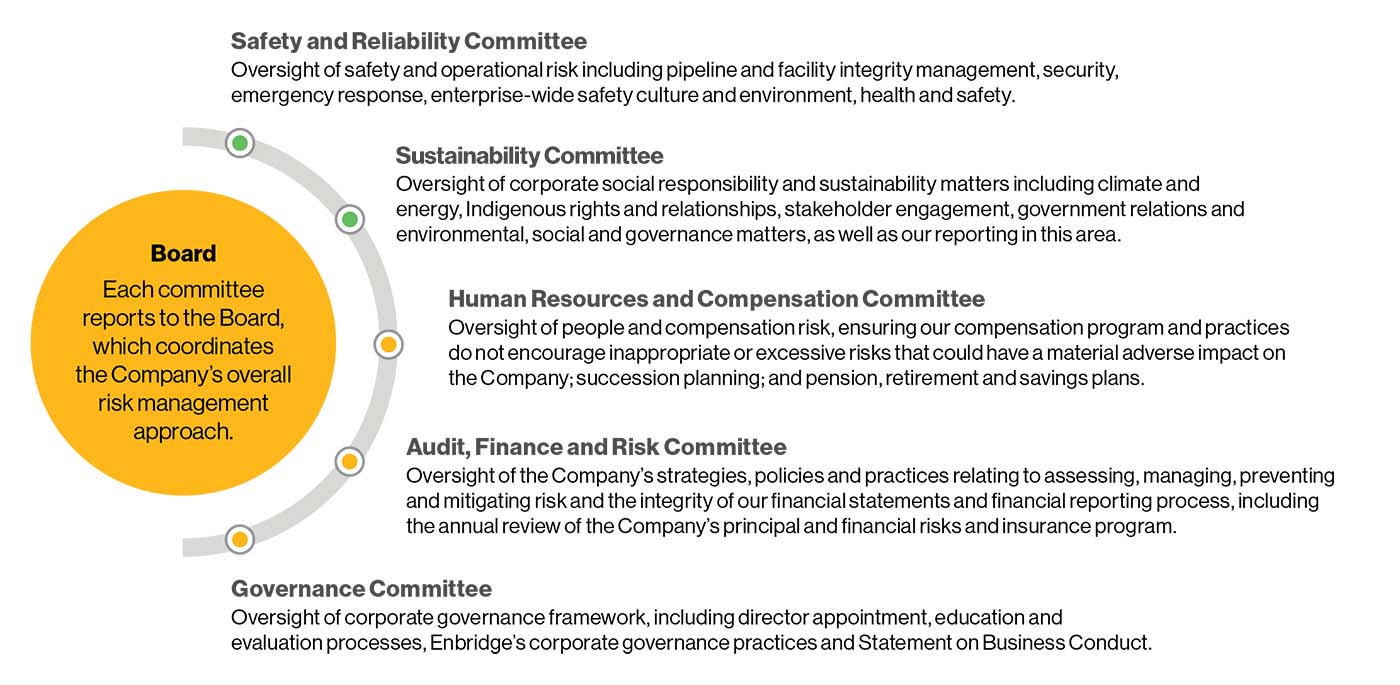Governance
This section discusses how climate-related risks and opportunities are part of our governance process.
Board Committee Accountabilities
Our Board carries out many of its responsibilities through five standing committees that are made up entirely of independent directors. Their responsibilities are summarized in the graphic below.
In particular, the following two committees have oversight on the effectiveness of Enbridge’s strategies and performance on climate-related risks and opportunities:
- Sustainability Committee: Oversight responsibilities include government policy and regulation on climate issues; implementation of Enbridge’s corporate climate policy; and stakeholder engagement on climate issues.
- Safety and Reliability Committee: Oversight responsibilities include the physical impacts of climate change.

Board Composition and Selection
We are committed to strong and sustainable corporate governance, which promotes the long-term interests of our shareholders, strengthens our Board and Management accountability and helps build public trust in Enbridge. We have a comprehensive system of stewardship and accountability that meets the requirements of all applicable rules, regulations, standards and internal and external policies.
Our diverse and highly engaged Board of Directors brings a range of viewpoints, deep expertise and strong energy-sector knowledge that helps ensure effective oversight of our strategic priorities and operations. Our Board has adopted a diversity policy which highlights the importance and value we place on differences in skills, experience, gender, ethnicity and geographic background. Five of our 11 directors (and five of our eight independent directors) are women.
For more information about our Board of Directors and our governance practices, please see Enbridge’s Notice of 2019 Annual Meeting and Proxy Statement available in the Reports and SEC Filings section of the Investment Center at enbridge.com
Director Education
All of our Board members participate in education sessions on key topics and developments. Our continuing education program for directors has provided our Board with presentations and discussions on climate and energy issues with leading external experts on environmental economics and on technological innovation and disruption.
Management Responsibilities
Our senior managers and corporate subject-matter experts provide regular briefings to the Sustainability Committee of our Board on climate-related issues and developments. These briefings are also informed by targeted outreach to key external stakeholders and decision makers on climate issues, including government policy makers, financial institutions, independent think tanks, customers, innovators and social and environmental non-government organizations.
Management is also accountable for oversight and execution of our reporting and disclosure on climate issues. This includes setting performance metrics and goals and engaging in special initiatives, such as development of this report, for advancing our practices and transparency on how we are preserving and building the value of our business during the shift to a lower emission economy.
In addition to ensuring that our Board is knowledgeable and briefed on climate issues material to our business, our ELT is responsible for ensuring adherence to a robust suite of corporate policies. Climate-related risks and opportunities are addressed in our policies, programs and management systems for governing pipeline safety and integrity, environmental management, emergency response and risk management. We also maintain a separate enterprise-wide policy on climate change.
Board Interface with Climate Scenario Planning
Enbridge has a robust, year-round strategic planning process which combines business unit perspectives with enterprisewide perspectives—including finance, corporate development, human resources and sustainability. We analyze energy fundamentals (using supply and demand scenarios) and existing and emerging trends to assess potential for disruptive change to our business. This process includes strategy sessions and continual updates between Management and the Board where proposed strategy is tested and debated. This culminates in an annual strategic plan and financial outlook that incorporates key scenarios, sensitivity analysis and climate-related developments. As these scenarios incorporate climate-related risks and opportunities, so too do our processes for governance, risk management and strategic planning.
Similarly, capital allocation decisions consider global and regional energy supply and demand fundamentals as well as competitive advantage opportunities based in costs, skills, technology, infrastructure and proximity to markets. Environmental and social factors are also considered in determining the cost of capital and form part of each capital investment decision. Key factors assessed as part of any investment decision include safety, carbon pricing trends, stakeholder engagement, Indigenous consultation and economic opportunity, and air, water and land protection.






